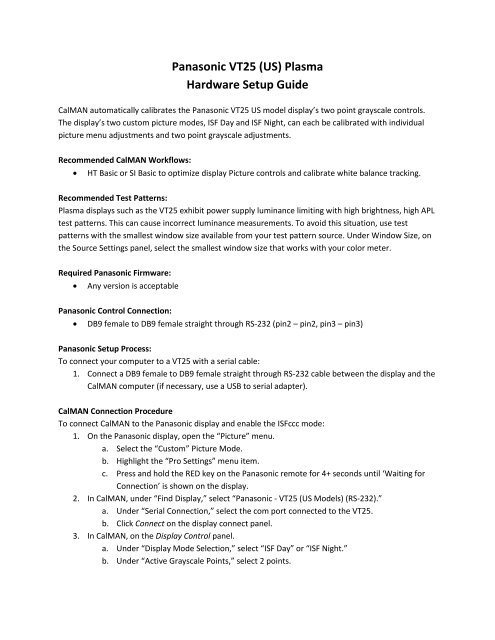Panasonic VT25 (US) Plasma Hardware Setup Guide - SpectraCal
Panasonic VT25 (US) Plasma Hardware Setup Guide - SpectraCal Panasonic VT25 (US) Plasma Hardware Setup Guide - SpectraCal
Panasonic VT25 (US) Plasma Hardware Setup Guide CalMAN automatically calibrates the Panasonic VT25 US model display’s two point grayscale controls. The display’s two custom picture modes, ISF Day and ISF Night, can each be calibrated with individual picture menu adjustments and two point grayscale adjustments. Recommended CalMAN Workflows: HT Basic or SI Basic to optimize display Picture controls and calibrate white balance tracking. Recommended Test Patterns: Plasma displays such as the VT25 exhibit power supply luminance limiting with high brightness, high APL test patterns. This can cause incorrect luminance measurements. To avoid this situation, use test patterns with the smallest window size available from your test pattern source. Under Window Size, on the Source Settings panel, select the smallest window size that works with your color meter. Required Panasonic Firmware: Any version is acceptable Panasonic Control Connection: DB9 female to DB9 female straight through RS-232 (pin2 – pin2, pin3 – pin3) Panasonic Setup Process: To connect your computer to a VT25 with a serial cable: 1. Connect a DB9 female to DB9 female straight through RS-232 cable between the display and the CalMAN computer (if necessary, use a USB to serial adapter). CalMAN Connection Procedure To connect CalMAN to the Panasonic display and enable the ISFccc mode: 1. On the Panasonic display, open the “Picture” menu. a. Select the “Custom” Picture Mode. b. Highlight the “Pro Settings” menu item. c. Press and hold the RED key on the Panasonic remote for 4+ seconds until ‘Waiting for Connection’ is shown on the display. 2. In CalMAN, under “Find Display,” select “Panasonic - VT25 (US Models) (RS-232).” a. Under “Serial Connection,” select the com port connected to the VT25. b. Click Connect on the display connect panel. 3. In CalMAN, on the Display Control panel. a. Under “Display Mode Selection,” select “ISF Day” or “ISF Night.” b. Under “Active Grayscale Points,” select 2 points.
<strong>Panasonic</strong> <strong>VT25</strong> (<strong>US</strong>) <strong>Plasma</strong><br />
<strong>Hardware</strong> <strong>Setup</strong> <strong>Guide</strong><br />
CalMAN automatically calibrates the <strong>Panasonic</strong> <strong>VT25</strong> <strong>US</strong> model display’s two point grayscale controls.<br />
The display’s two custom picture modes, ISF Day and ISF Night, can each be calibrated with individual<br />
picture menu adjustments and two point grayscale adjustments.<br />
Recommended CalMAN Workflows:<br />
<br />
HT Basic or SI Basic to optimize display Picture controls and calibrate white balance tracking.<br />
Recommended Test Patterns:<br />
<strong>Plasma</strong> displays such as the <strong>VT25</strong> exhibit power supply luminance limiting with high brightness, high APL<br />
test patterns. This can cause incorrect luminance measurements. To avoid this situation, use test<br />
patterns with the smallest window size available from your test pattern source. Under Window Size, on<br />
the Source Settings panel, select the smallest window size that works with your color meter.<br />
Required <strong>Panasonic</strong> Firmware:<br />
<br />
Any version is acceptable<br />
<strong>Panasonic</strong> Control Connection:<br />
<br />
DB9 female to DB9 female straight through RS-232 (pin2 – pin2, pin3 – pin3)<br />
<strong>Panasonic</strong> <strong>Setup</strong> Process:<br />
To connect your computer to a <strong>VT25</strong> with a serial cable:<br />
1. Connect a DB9 female to DB9 female straight through RS-232 cable between the display and the<br />
CalMAN computer (if necessary, use a <strong>US</strong>B to serial adapter).<br />
CalMAN Connection Procedure<br />
To connect CalMAN to the <strong>Panasonic</strong> display and enable the ISFccc mode:<br />
1. On the <strong>Panasonic</strong> display, open the “Picture” menu.<br />
a. Select the “Custom” Picture Mode.<br />
b. Highlight the “Pro Settings” menu item.<br />
c. Press and hold the RED key on the <strong>Panasonic</strong> remote for 4+ seconds until ‘Waiting for<br />
Connection’ is shown on the display.<br />
2. In CalMAN, under “Find Display,” select “<strong>Panasonic</strong> - <strong>VT25</strong> (<strong>US</strong> Models) (RS-232).”<br />
a. Under “Serial Connection,” select the com port connected to the <strong>VT25</strong>.<br />
b. Click Connect on the display connect panel.<br />
3. In CalMAN, on the Display Control panel.<br />
a. Under “Display Mode Selection,” select “ISF Day” or “ISF Night.”<br />
b. Under “Active Grayscale Points,” select 2 points.
<strong>Panasonic</strong> DDC Picture Controls:<br />
<strong>Panasonic</strong> Picture controls are available within the CalMAN software, allowing you to make display<br />
adjustments in the software, rather than using the display’s remote control. On those calibration<br />
workflow steps where you need to make a manual display adjustment (e.g. Brightness, Contrast,<br />
etc.), you can open the CalMAN DDC panel to make those adjustments from the CalMAN screen.<br />
<strong>Panasonic</strong> Display Calibration:<br />
<br />
<br />
<br />
<br />
<br />
<br />
AV Mode – Select C<strong>US</strong>TOM to enable the Pro Settings for calibration.<br />
Color Temp – Select WARM 1 or WARM 2 for color temperature closest to the D65 target.<br />
Black Level – Select DARK.<br />
Pro Settings/Gamma – Select 2.2 or 2.4 to test for best performance to selected target.<br />
Pro Settings/Panel Brightness (backlight) – Select HIGH, MID or LOW to set desired luminance<br />
level.<br />
Pro Settings/AGC (auto brightness) – Select OFF to disable auto brightness for accurate<br />
calibration.<br />
CalMAN AutoCal:<br />
<br />
<br />
Prior to CalMAN Grayscale AutoCal, set the display’s Brightness and Contrast controls to 50 and<br />
100, respectively.<br />
After AutoCal is complete, optimize the Brightness and Contrast controls for the viewing<br />
conditions.



